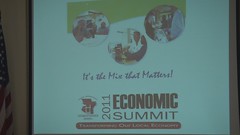 Usually silent VLCIA board member Tom Call got a board meeting agenda
item:
Usually silent VLCIA board member Tom Call got a board meeting agenda
item:
Mr. Jerry and I met on May the second to review the… I was kind of educating myself as to the current operating budget and how it applies… goes into forming next year’s budget…. There’s just a few differences from the 2011 budget to the proposed 2012 budget.He listed a couple of items:
- Line item 32: Park maintenance.
- Miller Business Park is added for this year.
- Below line 51: Signage.
- “Improve signage at some of our entrances.”
Here’s the video:
Diff Operating Budget —Tom Call @ VLCIA 17 May 2011
Regular Meeting, Valdosta-Lowndes County Industrial Authority (VLCIA),
Norman Bennett, Roy Copeland, Tom Call, Mary Gooding, Jerry Jennett chairman,
J. Stephen Gupton attorney, Allan Ricketts Acting Executive Director,
Valdosta, Lowndes County, Georgia, 17 May 2011.
Videos by John S. Quarterman for LAKE, the Lowndes Area Knowledge Exchange.
Clearly audible outside are people honking at the biomass protesters.
OMG! VLCIA has finally put Continue reading









